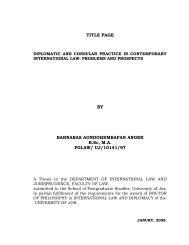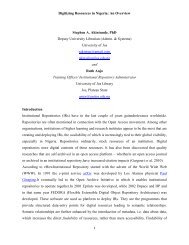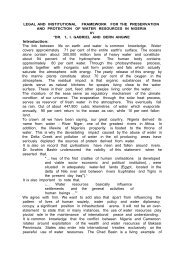Professor Atiene Solomon Sagay - University of Jos Institutional ...
Professor Atiene Solomon Sagay - University of Jos Institutional ...
Professor Atiene Solomon Sagay - University of Jos Institutional ...
Create successful ePaper yourself
Turn your PDF publications into a flip-book with our unique Google optimized e-Paper software.
In developed countries, the advent <strong>of</strong> modern obstetric care in the late 1930s gradually moved<br />
the process <strong>of</strong> childbirth from home to institutional settings, with post-partum follow-up and<br />
care by a skilled health-care provider. In most developing countries including Nigeria, the<br />
majority <strong>of</strong> women deliver at home without skilled health-care providers. The Nigerian<br />
Demographic and Health Survey 2008 reported that in the North-central zone <strong>of</strong> Nigeria,<br />
65% <strong>of</strong> pregnant women receive antenatal care while only 41% deliver in health facility<br />
(NDHS 2010). In Plateau State, Nigeria in 2004, a total <strong>of</strong> 71,655 women attended at least<br />
one antenatal visit but only 22,640 delivered in health facilities, indicating that over twothirds<br />
<strong>of</strong> women who attend antenatal care still deliver at home. Little wonder that we<br />
reported a maternal mortality ratio <strong>of</strong> 740 maternal deaths / 100,000 births (Ujah et.al 2005).<br />
The challenges to be met are not new technologies or new knowledge about effective<br />
interventions, because we mostly know what needs to be done to save the lives <strong>of</strong> mothers<br />
and newborns. The real challenges are how to deliver services and scale up interventions,<br />
particularly to those who are vulnerable, hard to reach, marginalized and excluded. Effective<br />
health interventions exist for mothers and babies such as post-abortal care, emergency<br />
obstetrics care, immunization, nutrition counselling and reproductive health services.<br />
However, none will work if political will is absent where it matters most: at national, state<br />
and local government levels.<br />
A key constraint limiting progress is the gap between what is needed and what exists in terms<br />
<strong>of</strong> skills and geographical availability <strong>of</strong> human resources at local, state and national levels.<br />
The Midwifery service scheme which is being implemented by the federal government<br />
through the national primary health care development agency (NPHCDA) is a commendable<br />
step. The table below highlights the nursing personnel gaps in PHCs in all 17 local<br />
government areas <strong>of</strong> Plateau State (Table 1).<br />
Other challenges are how to address deteriorating infrastructures; how to maintain stocks <strong>of</strong><br />
drugs, supplies and equipment in the face <strong>of</strong> increased demand; lack <strong>of</strong> transport; ineffective<br />
referral to and inadequate availability <strong>of</strong> 24-hour quality services – particularly emergency<br />
obstetric care services – and weak management systems. We need to challenge our policymakers<br />
and unit heads to refocus on the development <strong>of</strong> viable organizational strategies for<br />
monitoring and evaluation that ensure a continuum <strong>of</strong> care and account for every birth and<br />
death.<br />
South Africa is one <strong>of</strong> the few developing countries with a national confidential inquiry into<br />
maternal deaths. 164 health facilities obtain audit data for stillbirths and neonatal deaths, and<br />
a new audit network does so for child deaths. Three separate reports have been published,<br />
providing valuable information about avoidable causes <strong>of</strong> death for mothers, babies, and<br />
children. The leaders <strong>of</strong> these three reports have united to prioritise actions to save the lives<br />
<strong>of</strong> South Africa's mothers, babies, and children (Bradshaw et al 2008).<br />
Nigeria should establish a national confidential inquiry into maternal deaths and mandatorily<br />
obtain audit data for stillbirth, neonatal and child deaths. Although Edo and Ondo States have<br />
already promulgated the enabling laws, I advocate a national buy in and leadership at the<br />
national level.<br />
8













